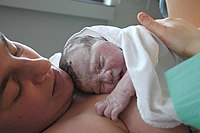
Photo from wikipedia
Abstract Childbirth self-efficacy is a useful measure for determining a woman's confidence in managing childbirth and for determining any preconceptions that require reinforcement. Childbirth self-efficacy is also particularly helpful in… Click to show full abstract
Abstract Childbirth self-efficacy is a useful measure for determining a woman's confidence in managing childbirth and for determining any preconceptions that require reinforcement. Childbirth self-efficacy is also particularly helpful in advising not only how to cope with birth, but also maternal well-being and fostering the improvement of a wide variety of perinatal outcomes. The present study aims to determine the factors affecting childbirth self-efficacy in pregnant women. The sample size consisted of 380 pregnant women between the ages of 18 and 45. Data were collected via face to face interviews using the Childbirth Self Efficacy Scale Short Form (CBSEI-32) in the Akdeniz University Hospital between November 2019 and February 2020 and used Chi-squared Automatic Interaction Detector analyses, resulting in a mean CBSEI-32 score of 244.279 ± 45.121. As a result of the analysis, it was seen that income status affects self-efficacy, and personal experiences such as foetal loss affect a woman’s childbirth self-efficacy. In addition, it was also found that the level of prenatal education affected childbirth self-efficacy. Health professionals should assess pregnant women during the antenatal period in terms of their childbirth self efficacy and prepare personalised training programs and plan initiatives to increase perceptions of self-efficacy. IMPACT STATEMENT What is already known on this subject? Childbirth self-efficacy is one of the important psychological parameters to determine a woman's belief in her confidence in managing childbirth and to measure women's perceptions of her need for reinforcement. What do the results of this study add? Sociodemographic and obstetric characteristics of women affect their childbirth self-efficacy perception positively and negatively. Women's birth self-efficacy can be improved positively with prenatal education. In addition, it is one of the interesting findings of the study that the self-efficacy level of women who had a previous low experience was high. What are the implications of these findings for clinical practice and/or further research? Women's childbirth self efficacy can be improved with trainings and appropriate nursing interventions. For this reason, it is important to determine the factors affecting the self-efficacy perception of women. In future studies, the childbirth self-efficacy perceptions of women in different samples (risky pregnancy, disabled pregnant, etc.) should be measured.
Journal Title: Journal of Obstetrics and Gynaecology
Year Published: 2022
Link to full text (if available)
Share on Social Media: Sign Up to like & get
recommendations!